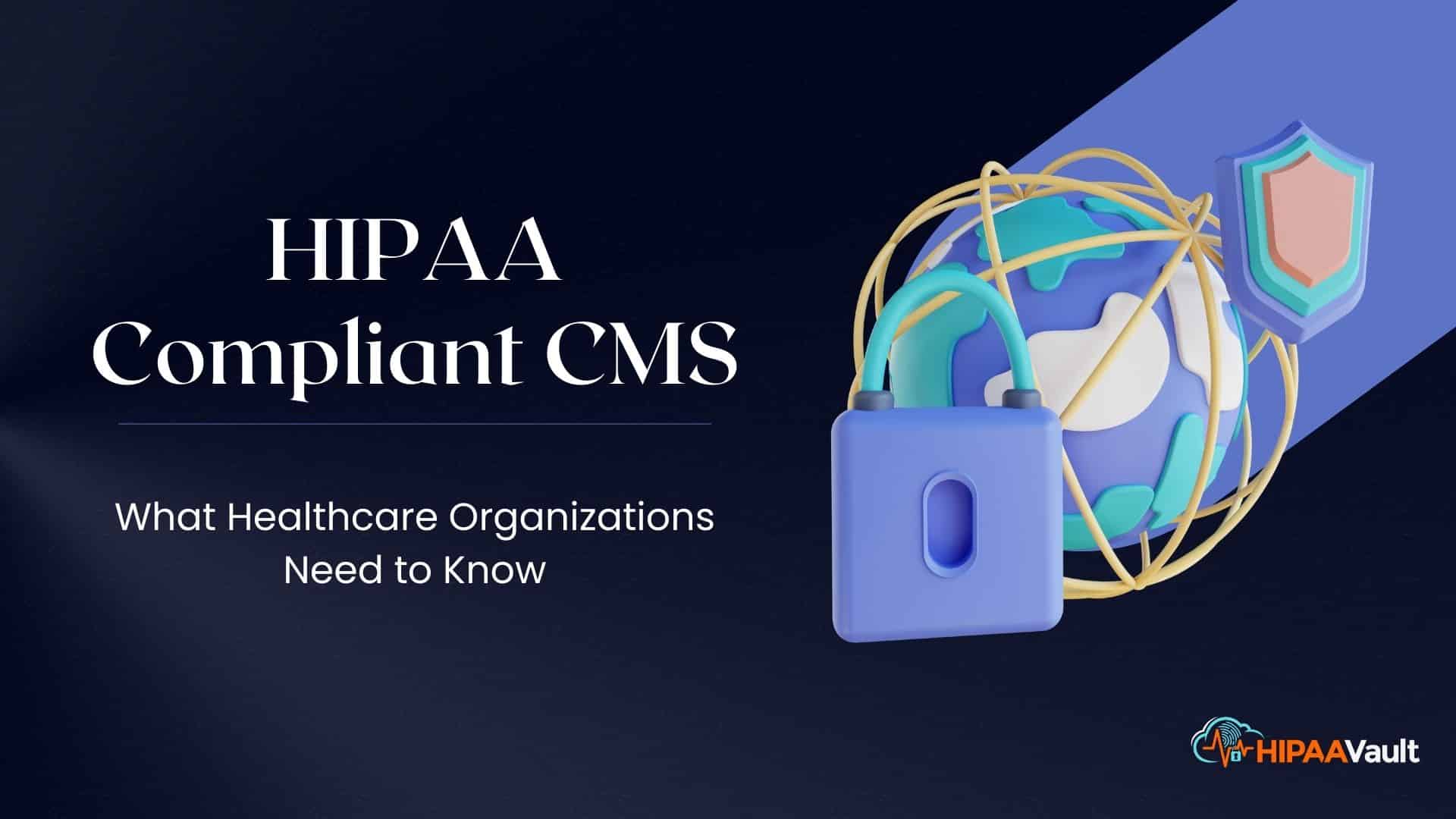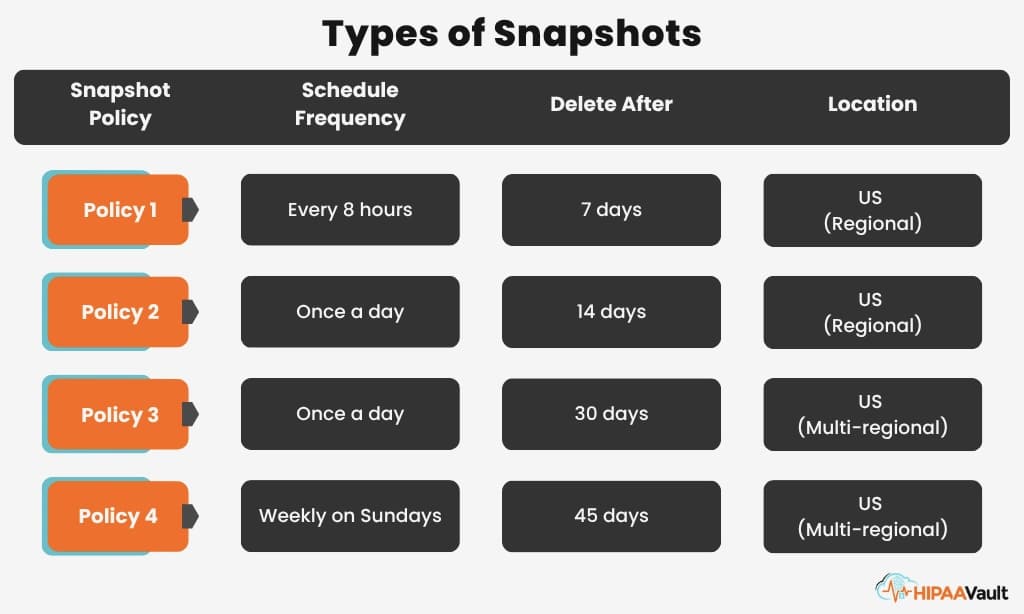If your healthcare organization is redesigning its website, choosing a HIPAA compliant CMS isn’t optional—it’s essential. Protected Health Information (PHI) is regulated under the HIPAA Security Rule, and even something as simple as a contact form submission can trigger compliance obligations.
The right CMS can protect PHI, streamline workflows, and give patients a seamless experience. The wrong CMS could expose your organization to costly HIPAA violations.
👉 Talk to a HIPAA expert to see how HIPAA Vault secures healthcare deployments.
CMS Basics: Why Compliance Is Critical in Healthcare
A CMS (Content Management System) is an easy-to-use platform that allows organizations to build, manage, and update websites without needing deep technical or coding expertise. This convenience makes CMS platforms like WordPress, Joomla, and Drupal extremely popular—together, they power more than a quarter of all websites on the internet.
However, convenience doesn’t equal compliance. When PHI is involved, extra steps must be taken to ensure that the CMS and its hosting environment meet HIPAA standards.
All CMS products rely on a database to store text, images, videos, and other content. In a HIPAA-compliant setup:
- The database must be encrypted.
- The host database should have a dedicated IP address, separate from where the site content resides.
- Ideally, these should be segmented behind a network switch to make unauthorized access more difficult.
👉 Download our HIPAA Website Compliance Checklist to see the full list of CMS security requirements.
Why Standard CMS Platforms Fail Healthcare Websites
Popular CMS platforms like WordPress, Joomla, and Drupal are widely used. But out-of-the-box, none of them are HIPAA compliant.
The main issues are:
- No default encryption for databases storing PHI
- Limited built-in authentication and logging
- No BAA available directly from open-source providers
- High vulnerability to third-party plugin exploits
While plugins can add features such as two-factor authentication, compliance requires more than just add-ons. The underlying hosting, database setup, and security infrastructure must also meet HIPAA standards.
For guidance, the NIST Cybersecurity Framework provides a strong baseline for protecting sensitive data in healthcare systems.
👉 Related reading: HIPAA Compliant Hosting Explained
Comparing the Top CMS Options for HIPAA Compliance
| CMS Platform | Ease of Use | Security (Default) | HIPAA Compliance Requirements | Best Fit For |
| WordPress | ⭐⭐⭐⭐⭐ (Very easy) | ⭐⭐ (Low – most targeted) | Requires HIPAA hosting, database encryption, two-factor authentication, SSL, audit logs, BAA | Small–mid medical practices wanting easy site management |
| Joomla | ⭐⭐⭐⭐ (Moderate) | ⭐⭐⭐ (Stronger than WordPress) | Requires HIPAA hosting, 2FA plugin, encryption, BAA | Organizations with moderate IT resources needing more control |
| Drupal | ⭐⭐⭐ (Advanced) | ⭐⭐⭐⭐ (High – robust security) | Requires technical expertise, HIPAA hosting, encryption, add-ons, BAA | Larger healthcare organizations with in-house IT teams |
| Proprietary HIPAA CMS (SaaS) | ⭐⭐⭐⭐ (Easy – vendor-managed) | ⭐⭐⭐⭐ (High – compliance built-in) | Typically includes HIPAA hosting, encryption, audit logging, BAA | Practices that want an all-in-one HIPAA-ready solution |
👉 Pro tip: For many organizations, the deciding factor isn’t the CMS itself—it’s whether the hosting and vendor support include HIPAA compliance guarantees like a signed BAA, encrypted databases, and long-term audit log retention.
Which CMS Is Right for You?
- If you want simplicity: WordPress may be the easiest option, but only when paired with HIPAA-compliant managed hosting.
- If you need balance: Joomla offers flexibility and stronger controls, but still requires HIPAA hosting and careful setup.
- If you need maximum control: Drupal is the most powerful, but also the most complex—best suited for larger organizations with IT resources.
- If you want peace of mind: Proprietary HIPAA SaaS CMS solutions handle most compliance details for you, making them ideal for teams without technical staff.
No matter which CMS you choose, your compliance ultimately depends on the hosting, database security, and BAA coverage behind the platform.
👉 Talk to a HIPAA Expert to see how HIPAA Vault delivers HIPAA-compliant hosting, database encryption, and end-to-end safeguards—so you can launch with confidence.
Technical Safeguards for a HIPAA CMS
To ensure compliance, a HIPAA CMS environment should include:
- Encryption at rest and in transit
- Dedicated IP addresses for CMS and database servers
- Two-factor authentication for admin access
- SSL (Secure Sockets Layer) certificates for encrypted sessions between server and client
- Audit logs to track user/system access, retained for at least 6 years per HHS HIPAA requirements
- Disaster recovery and backups in HIPAA-certified facilities
👉 Get Pricing & Compare HIPAA Solutions
Standard WordPress Isn’t HIPAA-Compliant. This One Is.
Never lose sleep over fines. We handle security updates, backups, and compliance monitoring so you can focus on patients. Includes free SSL and migration.
Learn MoreHIPAA CMS Compliance Checklist
Before launching your healthcare website, confirm:
- Your CMS hosting provider signs a Business Associate Agreement (BAA)
- Your CMS database is encrypted and isolated
- Two-factor authentication and audit logging are enabled
- SSL/TLS encryption is in place
- Logs and backups are retained in compliance with HIPAA
Use our free HIPAA Website Compliance Checklist to evaluate your setup step-by-step.
Choosing the Right CMS for Your Website
CMS platforms make website management easy, but HIPAA compliance requires additional safeguards. Whether you choose WordPress, Joomla, or Drupal, your organization must secure hosting, configure the CMS properly, and ensure all PHI is encrypted and logged.
Once compliance controls are in place, your CMS becomes a powerful tool for delivering patient information securely and efficiently.
👉 Let’s Talk Compliance to see how Hippavault helps healthcare organizations launch compliant websites with confidence.
FAQ: HIPAA Compliant CMS
Is WordPress HIPAA compliant?
Not by default. WordPress requires HIPAA hosting, database encryption, security plugins, and a signed BAA to be compliant.
Does a CMS need a BAA to be HIPAA compliant?
Yes. Without a BAA from your hosting or CMS provider, compliance is impossible.
What are the risks of using a non-HIPAA compliant CMS?
Non-compliance risks include data breaches, regulatory fines, reputational harm, and patient trust loss.
Can a HIPAA CMS integrate with EHR systems?
Yes. Many HIPAA-ready CMS solutions support secure integrations with EHR platforms and patient portals.








